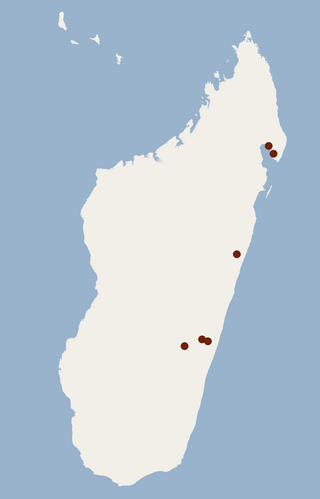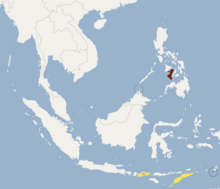
The little bent-wing bat or little long-fingered bat is a species of vesper bat in the family Miniopteridae. It is found in Australia, Indonesia, the Philippines, and Vanuatu.
The lesser long-fingered bat, also known as the black clinging bat or lesser bent-winged bat, is a species of vesper bat in the family Miniopteridae. It is found in western Southern Africa, south East Africa, and parts of Central Africa. Its natural habitats are temperate forests, temperate shrubland, and caves and other subterranean habitats.
The Southeast Asian long-fingered bat is a species of vesper bat in the family Miniopteridae. It is endemic to Japan and has been assessed as endangered by the IUCN.

Glen's long-fingered bat is a species of vesper bat in the family Miniopteridae found only in Madagascar.

The western bent-winged bat is a species of vesper bat in the family Miniopteridae. It can be found in the following countries: China, India, Indonesia, Laos, Malaysia, Myanmar, Papua New Guinea, Thailand, Timor-Leste, and Vietnam.

The Manavi long-fingered bat is a bat in the genus Miniopterus that occurs in east-central Madagascar. First described in 1906, this species was later included in the mainland African M. minor. A 1995 revision united populations of small Miniopterus from Madagascar and the Comoros as M. manavi, but molecular and morphological studies in 2008 and 2009 showed that this concept of M. manavi in fact included five different species. M. manavi itself was restricted to a few locations in the eastern Central Highlands and populations in the Comoros and northern and western Madagascar were allocated to different species.

The intermediate long-fingered bat is a species of vesper bat in the family Miniopteridae. It can be found in Indonesia, Malaysia, and Thailand and possibly also in Papua New Guinea and the Solomon Islands,
The least long-fingered bat is a species of vesper bat in the family Miniopteridae. It can be found in the Republic of the Congo, the Democratic Republic of the Congo, Kenya, São Tomé and Príncipe, and Tanzania.

The small bent-winged bat is a species in the bat family Miniopteridae, which has similarities and distinctive differences from the family of vesper bats. A novel version of coronavirus has been identified in this species. It can be found in Bangladesh, Bhutan, India, Indonesia, Laos, Malaysia, Nepal, Philippines, Thailand and Vietnam.

The common bent-wing bat, also known as the Schreibers's long-fingered bat or Schreibers's bat, is a species of insectivorous bat. They appear to have dispersed from a subtropical origin and distributed throughout the southern Palearctic, Ethiopic, Oriental, and Australian regions. In Europe, it is present in the southern half on the continent from Iberia to the Caucasus, with the largest populations found in the warmer Mediterranean area. The common and scientific names honor Carl Franz Anton Ritter von Schreibers.

The great bent-winged bat is a species of vesper bat in the family Miniopteridae. It can be found in Indonesia, Papua New Guinea, Philippines, Solomon Islands, and Vanuatu.

Miniopterus, known as the bent-winged or long winged bats, is the sole genus of the family Miniopteridae. They are small flying insectivorous mammals, micro-bats of the order Chiroptera, with wings over twice the length of the body. The genus had been placed in its own subfamily among the vespertilionid bats, as Miniopterinae, but is now classified as its own family.

Miniopterus griveaudi is a bat in the genus Miniopterus found on Grande Comore and Anjouan in the Comoros and in northern and western Madagascar. First described in 1959 from Grande Comore as a subspecies of the mainland African M. minor, it was later placed with the Malagasy M. manavi. However, morphological and molecular studies published in 2008 and 2009 indicated that M. manavi as then defined contained five distinct, unrelated species, and M. griveaudi was redefined as a species occurring on both Madagascar and the Comoros.

Peterson's long-fingered bat is a bat in the genus Miniopterus which occurs in southeast Madagascar. It was described by Steven M. Goodman et al. in 2008. While M. petersoni is similar to M. sororculus, the two species are not closely related to each other, and possess a number of differing external and cranial characteristics.

Eger's long-fingered bat is a species of long-fingered bat found in Madagascar.

Miniopterus sororculus is a species of bat endemic to the highland forests of Madagascar.
Miniopterus maghrebensis, also known as the Maghrebian bent-wing bat, is a species of bat found in North Africa.
Miniopterus pallidus, the pale bent-wing bat, is a species of bat found in Middle-East. Until 2010, it was considered as a sub-species of M. schreibersii.













